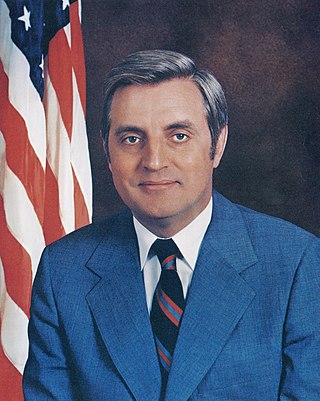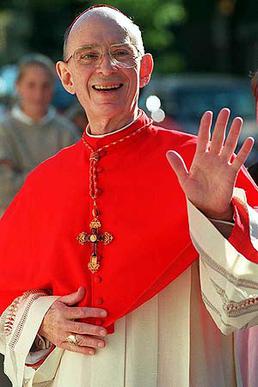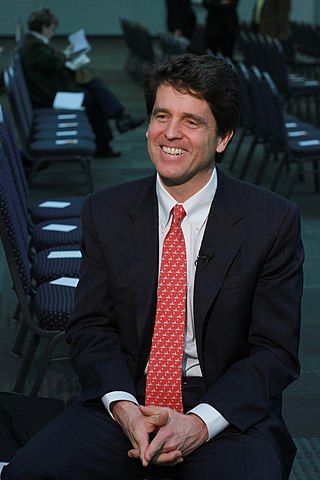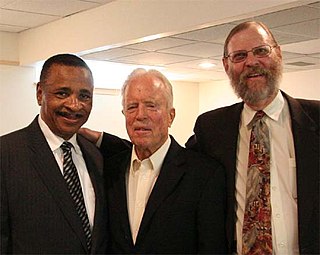
James Earl Carter Jr. is an American politician and humanitarian who served as the 39th president of the United States from 1977 to 1981. A member of the Democratic Party, Carter was the 76th governor of Georgia from 1971 to 1975, and a Georgia state senator from 1963 to 1967. At age 99, he is both the oldest living former U.S. president and the longest-lived president in U.S. history.

Walter Frederick "Fritz" Mondale was an American lawyer and politician who served as the 42nd vice president of the United States from 1977 to 1981 under President Jimmy Carter. A U.S. senator from Minnesota from 1964 to 1976, he was the Democratic Party's nominee in the 1984 presidential election, but lost to incumbent Ronald Reagan in an Electoral College and popular vote landslide.

Thomas Carlyle was a British essayist, historian, and philosopher from the Scottish Lowlands. A leading writer of the Victorian era, he exerted a profound influence on 19th-century art, literature, and philosophy.

James Addison Baker III is an American attorney, diplomat and statesman. A member of the Republican Party, he served as the 10th White House Chief of Staff and 67th United States Secretary of the Treasury under President Ronald Reagan and the 61st U.S. Secretary of State before returning as the 16th White House Chief of Staff under President George H. W. Bush.

Robert Sargent Shriver Jr. was an American diplomat, politician, and activist. As the husband of Eunice Kennedy Shriver, he was part of the Kennedy family. Shriver was the driving force behind the creation of the Peace Corps, and founded the Job Corps, Head Start, VISTA, Upward Bound, and other programs as the architect of the 1960s War on Poverty. He was the Democratic Party's nominee for vice president in the 1972 presidential election.

Wake Forest University (WFU) is a private research university in Winston-Salem, North Carolina, United States. Founded in 1834, the university received its name from its original location in Wake Forest, north of Raleigh, North Carolina. The Reynolda Campus, the university's main campus, has been located north of downtown Winston-Salem since the university moved there in 1956. The Atrium Health Wake Forest Baptist medical campus has two locations, the older one located near the Ardmore neighborhood in central Winston-Salem, and the newer campus at Wake Forest Innovation Quarter downtown. The university also occupies laboratory space at Biotech Plaza at Innovation Quarter, and at the Center for Nanotechnology and Molecular Materials. The university's Graduate School of Management maintains a presence on the main campus in Winston-Salem and in Charlotte, North Carolina.

Joseph Louis Bernardin was an American Cardinal of the Catholic Church. He served as Archbishop of Cincinnati from 1972 until 1982, and as Archbishop of Chicago from 1982 until his death in 1996 from pancreatic cancer. Bernardin was elevated to the cardinalate in 1983 by Pope John Paul II.

Maria Owings Shriver is an American journalist, author, a member of the Kennedy family, former First Lady of California, and the founder of the nonprofit organization The Women's Alzheimer's Movement. She was married to former governor of California and actor Arnold Schwarzenegger, from whom she filed for divorce in 2011 and which was finalized in 2021.

Mark Kennedy Shriver is an American Democratic politician who served as a member of the Maryland House of Delegates for two consecutive terms, from 1995 to 2003.

Robert Schwarz Strauss was an influential figure in American politics, diplomacy, and law whose service dated back to future President Lyndon Johnson's first congressional campaign in 1937. By the 1950s, he was associated in Texas politics with the faction of the Democratic Party that was led by Johnson and John Connally. He served as the Chairman of the Democratic National Committee between 1972 and 1977 and served under President Jimmy Carter as the U.S. Trade Representative and special envoy to the Middle East. He later served as the Ambassador to Russia under President George H.W. Bush. Strauss also served as the last United States Ambassador to the Soviet Union.

Irving Babbitt was an American academic and literary critic, noted for his founding role in a movement that became known as the New Humanism, a significant influence on literary discussion and conservative thought in the period between 1910 and 1930. He was a cultural critic in the tradition of Matthew Arnold and a consistent opponent of romanticism, as represented by the writings of Jean-Jacques Rousseau. Politically he can, without serious distortion, be called a follower of Aristotle and Edmund Burke. He was an advocate of classical humanism but also offered an ecumenical defense of religion. His humanism implied a broad knowledge of various moral and religious traditions. His book Democracy and Leadership (1924) is regarded as a classic text of political conservatism. Babbitt is regarded as a major influence over American cultural and political conservatism.
David Hackett Fischer is University Professor of History Emeritus at Brandeis University. Fischer's major works have covered topics ranging from large macroeconomic and cultural trends to narrative histories of significant events to explorations of historiography.

Colman McCarthy is an American journalist, teacher, lecturer, pacifist, progressive, anarchist, and long-time peace activist, directs the Center for Teaching Peace in Washington, D.C. From 1969 to 1997, he wrote columns for The Washington Post. His topics ranged from politics, religion, health, and sports to education, poverty, and peacemaking. Washingtonian magazine called him "the liberal conscience of The Washington Post." Smithsonian magazine said he is "a man of profound spiritual awareness." He has written for The New Yorker, The Nation, The Progressive, The Atlantic, The New York Times, and Reader's Digest. Since 1999, he has written biweekly columns for National Catholic Reporter.

Jack Hood Vaughn was the second director of the United States Peace Corps, succeeding Sargent Shriver. Vaughn was appointed Peace Corps director in 1966 by President Lyndon Johnson and was the first Republican to head the agency.
Irving Louis Horowitz was an American sociologist, author, and college professor who wrote and lectured extensively in his field, and his later years came to fear that it risked being seized by left-wing ideologues. He proposed a quantitative index for measuring a country's quality of life, and helped to popularize "Third World" as a term for the poorer nations of the Non-Aligned Movement. He was considered by many to be a neoconservative, although he maintained that he had no political adherence.

The 1972 United States presidential election in Massachusetts took place on November 7, 1972, as part of the 1972 United States presidential election, which was held throughout all 50 states and D.C. Voters chose 14 representatives, or electors to the Electoral College, who voted for president and vice president.
Charles William Maynes was a United States diplomat and long-time editor of Foreign Policy magazine.

Linda Sue Carter Brinson is an American writer, journalist, and editor. She was the first woman assistant national editor at The Baltimore Sun and the first woman editorial page editor at the Winston-Salem Journal.

Irving Edward Carlyle was an American lawyer and politician.
















